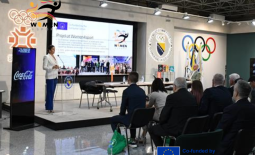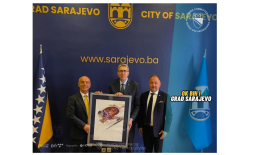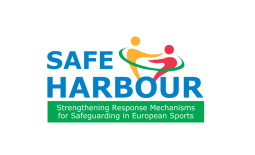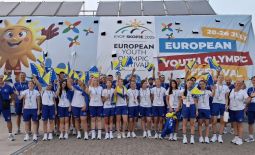BiH Olympic Committee has its first climate change officer
At the Brussels headquarters, awards were ceremoniously presented to Climate Change Officers from 18 European countries, as part of the OCEAN (Olympic Commitments for the Environment) project, which has been bringing together key sports, scientific, and climate actors for two and a half years with the aim of reducing the carbon footprint and building a sustainable sports and social system overall.
The project is funded by the European Commission, and the initiative is led by the European Olympic Committees, in cooperation with the leading scientific partner, Öko Institute from Germany.
Among the laureates was Associate Professor Dr. Sci. Maja Đurić from Travnik, an EU expert coordinator and collaborator of the Olympic Committee of Bosnia and Herzegovina, who became the first "Climate Change Officer" from Bosnia and Herzegovina. Her recognition represents not only a personal achievement but also an important institutional step forward for the country toward a more responsible, strategic, and sustainable approach to the climate crisis.
“This recognition is not only a personal satisfaction; it is proof that Bosnia and Herzegovina, through the Olympic Committee BiH, has the capacity to be part of European strategic efforts in fighting climate change. The Bosnia and Herzegovina Olympic Committee was among the first to recognize the importance of this issue and, as a credible EU partner, demonstrated that sport can be a driver of sustainable change,” emphasized Dr. Đurić after the ceremony in Brussels.
The goal of the OCEAN project was to create an educational and strategic framework for reducing CO₂ emissions within sports organizations. Through education, measuring carbon footprints, and developing concrete action plans, Climate Change Officers became experts in connecting sports and sustainability, strategic planning, and change management in the era of the climate crisis.
As stated in the educational modules, they “learned to understand the impact of climate change on sports, the role of the sports sector in environmental protection, and built the foundation for institutional transformation for life.”
In this context, the Olympic Committee of Bosnia and Herzegovina was an equal partner in this prestigious European consortium, together with 18 countries and three major international organizations.
“Considering that I come from both the governmental and non-governmental sectors, this recognition gives me additional responsibility, but also an opportunity to transfer acquired knowledge and experience to the academic community, the cultural sector, sports, and youth work. Because climate resilience is built precisely where we educate, create, and inspire the new generation,” said Dr. Đurić.
In an era when climate change is no longer a prediction but a daily reality, such projects and recognitions become key tools for systemic change from within. Bosnia and Herzegovina, through the concrete engagement of its representatives, is sending a clear message: we are ready to be part of the solution, not just part of the problem.



